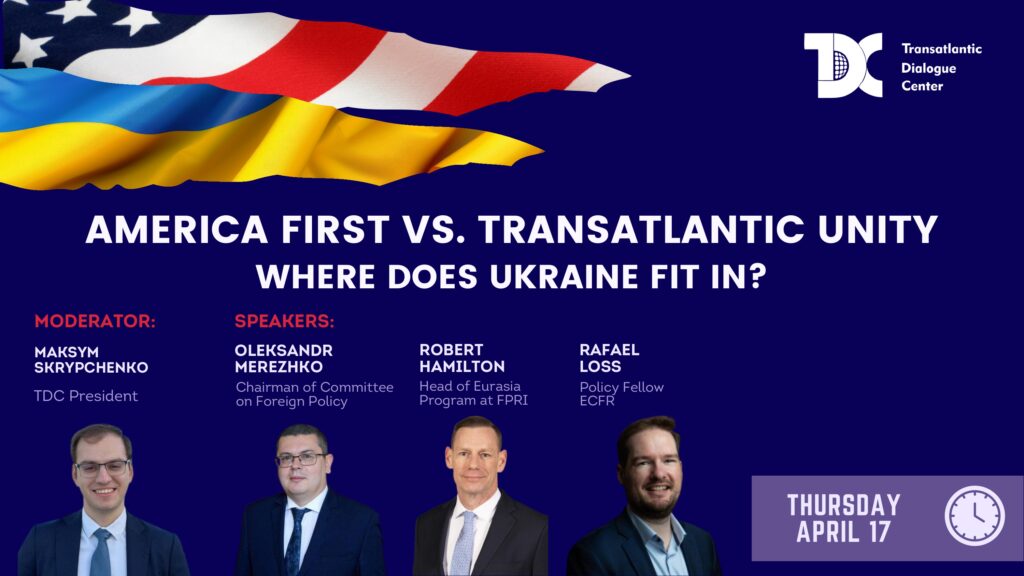On April 17, 2025, the Transatlantic Dialogue Center hosted a timely and thought-provoking discussion titled “America First vs. Transatlantic Unity – Where Does Ukraine Fit In?” The event brought together leading voices from Ukraine, the EU, and the United States to assess Ukraine’s role amidst shifting geopolitical dynamics in the U.S. and Europe’s pursuit of greater strategic autonomy.
The panel, moderated by Maksym Skrypchenko, President of the Transatlantic Dialogue Center, featured:
- Oleksandr Merezhko – Chairman of the Committee on Foreign Policy
- Robert Hamilton – Head of Eurasia Program at FPRI
- Rafael Loss – Policy Fellow at ECFR
The discussion underscored growing uncertainty around the future of transatlantic unity, especially in light of potential shifts in U.S. foreign policy. Speakers emphasized the urgent need for Europe to take greater responsibility for its own defense, while highlighting Ukraine’s battlefield experience as a valuable asset for NATO and EU security planning. They also stressed the moral importance of supporting Ukraine’s democratic resistance, warned of the limited effectiveness of current sanctions against Russia, and called for stronger, more unified responses to the expanding alignment between authoritarian powers such as Russia, China, Iran, and North Korea.
Key insights from the discussion:
Oleksandr Merezhko underlined the strategic link between Ukraine’s security and the broader security of NATO’s eastern flank, calling Ukraine the “gate and shield of Europe.” He advocated for Ukraine’s EU membership as both a geopolitical necessity and a deterrent to Russian aggression. He also stressed the legal and moral case for transferring frozen Russian assets to Ukraine as part of international accountability.
Rafael Loss addressed the shifting focus of U.S. strategic priorities toward the Indo-Pacific and the resulting need for Europe to assume a greater share of defense responsibilities. He highlighted growing interoperability efforts within NATO, the formation of coalitions of the willing to support Ukraine, and the practical challenges of deepening European defense cooperation.
Robert Hamilton noted the limitations of existing sanctions against Russia, citing enforcement gaps and the country’s ability to adapt. He proposed the “porcupine model” of defense as a viable interim strategy for Ukraine in the absence of NATO membership and emphasized the economic dimension of U.S. foreign policy — suggesting that European purchases of U.S.-made weapons for Ukraine could influence Washington’s continued support.
We extend our sincere thanks to our distinguished panelists and all attendees for their engagement in this important dialogue.
The event was organized with the support of the International Renaissance Foundation.



